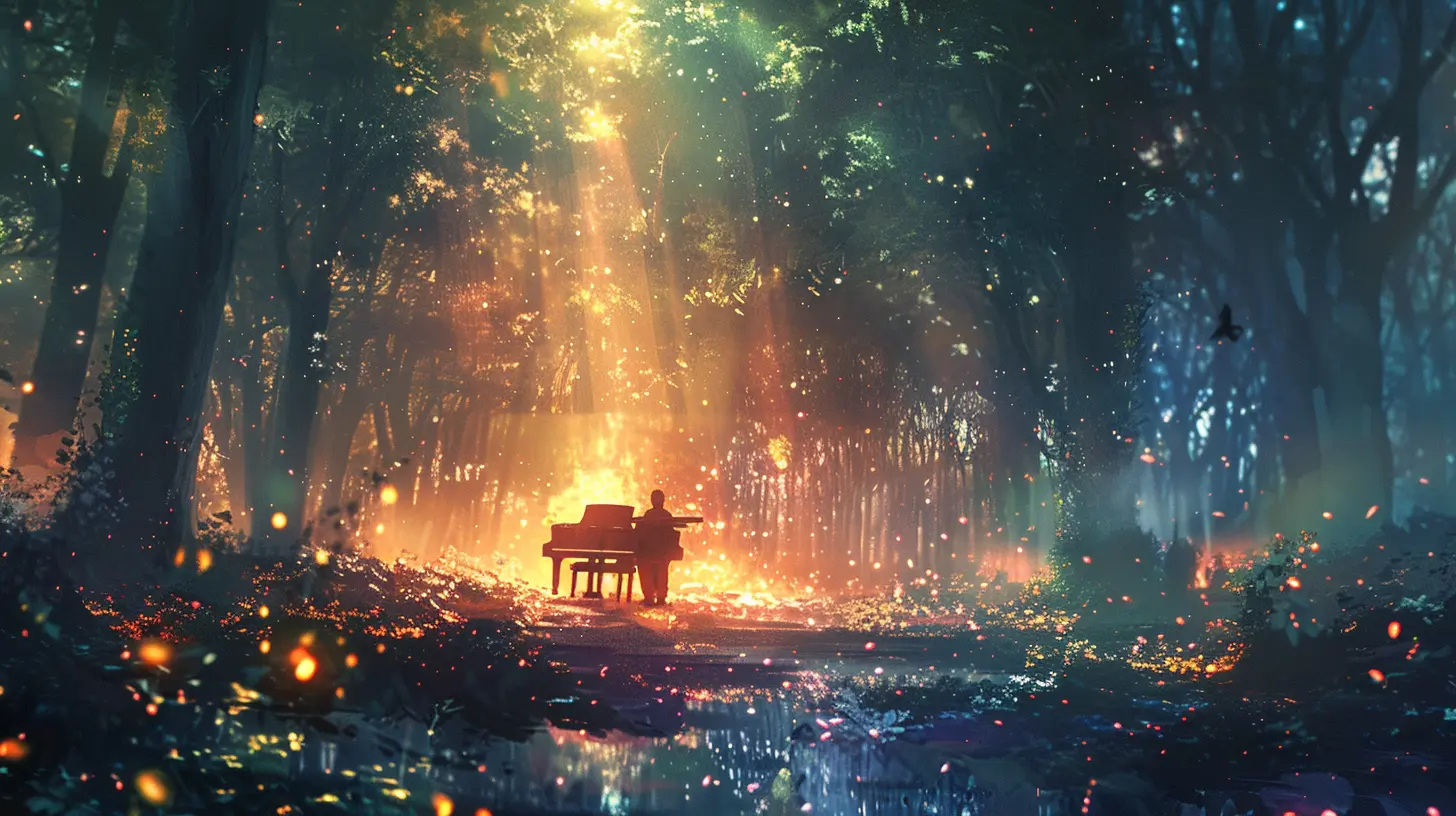How Music Shapes Emotional Journeys in Interactive Stories
21 November 2025
Hey, quick question—have you ever been so immersed in a game that the background music gave you literal goosebumps? Maybe it made you feel jubilant after conquering a boss, or downright weepy during a heartfelt goodbye. Yeah, same here. That's the unspoken power of music in interactive storytelling. It’s like the unsung hero (pun intended) that tugs at your emotions and keeps you glued to the screen. But how does it work, exactly? And why is music such a vital part of gaming narratives?
Let’s crank up the volume on this topic and see what makes music the emotional backbone of interactive stories!
The Role of Music in Games: More Than Just Background Noise
Okay, first things first—music in games isn’t just there to fill the silence. It’s not like the elevator music you awkwardly nod along to while heading to the 15th floor. Nope. In interactive storytelling, music does heavy lifting. It sets the tone, builds tension, creates atmosphere, and, most importantly, connects you to the characters and their journey in ways words can’t.Ever notice how the music in a game shifts when something big is about to happen? That’s no accident. It’s like the soundtrack is whispering, “Hey, get ready. Stuff’s about to go down.” For instance, remember how the eerie piano chords in Silent Hill made you feel like the monsters were drooling behind you? Or how the triumphant orchestral swells in The Legend of Zelda felt like a pat on the back after solving that ridiculously annoying puzzle? Yeah, music matters.
Setting the Scene: The Art of Atmosphere
Imagine booting up a game, and all you hear is silence. Awkward, right? Music brings worlds to life. It’s the emotional paintbrush that gives texture to the game's environment. A creepy cave with haunting melodies feels alive, while a bustling market with upbeat tunes suddenly feels vibrant and real.Take Skyrim, for example. The moment you hear Jeremy Soule’s hauntingly beautiful theme, “Dragonborn,” you’re instantly transported to the frozen, Norse-inspired land of Tamriel. That song doesn’t just play in the background—it is the world. And every time you hear it, you’re reminded of your role in that epic tale.
Music doesn’t just accompany the environment—it is the environment.
A Quick Sidebar: Dynamic Music
Here’s where interactive games have a leg up over movies: dynamic music. What’s that, you ask? It’s when the music changes based on what you’re doing in the game. It’s like having a personal DJ who knows your every mood and move.Take Red Dead Redemption 2. Say you're sauntering through the wilderness, and the music is soft and melodic, matching the serene vibe. Suddenly, a grizzly bear charges at you, and the music cranks up to a frenetic pace, making your heart race. This isn’t just cool—it’s immersive. It draws you deeper into the story because the soundtrack isn’t static; it reacts to your actions.
It’s like the game is saying, “I see you, cowboy. Let’s match the vibes.”
Musical Storytelling: When Notes Speak Louder Than Words
Want to know a secret? Sometimes, music says what dialogue can’t. A well-crafted soundtrack dumps exposition right into your lap—all without a single word.Take Journey, for instance. That game doesn’t even have dialogue, yet it takes you on an emotional rollercoaster, thanks to Austin Wintory’s masterful score. The music grows, ebbs, and flows with your journey, making you feel the story rather than just witness it. By the time you’re sliding down golden sand dunes to those angelic strings, you’re like, “Yep, I’m emotionally invested.”
Music speaks where words fail, and that’s what makes it a storytelling powerhouse.
Emotional Manipulation? You Bet!
Alright, let’s be real: music in games is totally there to mess with your emotions—and that’s perfectly fine! Whether it’s a gut-wrenching ballad that makes you ugly cry (I’m looking at you, To the Moon), or a bombastic battle anthem that makes you wanna punch the air like Rocky, it’s designed to make you feel something.Think about Final Fantasy VII and the heartbreak that unfolds with Aerith’s death (oops, spoiler alert, but c’mon, it’s been decades). The melody “Aerith’s Theme” plays as you process the emotional weight of that scene, and BOOM—cue the waterworks. Without that music, the scene would still be sad, sure, but not "cry-yourself-to-sleep" sad. Music amplifies those feelings tenfold.
Games know how to pull at your heartstrings, and music is the puppet master behind it all.
Player Agency and Musical Cues
Now, let’s talk about something super interesting: how music in interactive stories can influence your decisions. Yup, you heard me. Music isn’t just passive—sometimes, it’s a gameplay mechanic in its own right.Take The Walking Dead by Telltale Games. In moments where you have to make tough, gut-wrenching decisions, the music ramps up the tension. It’s not just there for drama—it’s skewing your judgment. You might make a choice based on how the music makes you feel rather than cold, hard logic. Crafty, right?
So yeah, music doesn’t just guide the story—it guides you.
Can We Talk About Theme Songs?
Fun fact: A good theme song can make or break a game. It’s the musical signature that sticks with you long after you’ve tossed the controller aside.Case in point: Halo’s iconic Gregorian chant. The second you hear it, you’re like, "Time to save the galaxy," even if you haven’t played the game in years. Or GTA: San Andreas with its ‘90s hip-hop beats that perfectly capture the vibe of the game’s setting. These songs are more than catchy—they’re identity markers. They define the game and etch themselves into your brain, ready to evoke nostalgia at the press of the play button.
The Science Behind It: Why Music Messes With Your Brain
Alright, let’s get a teensy bit nerdy for a sec. Ever wonder why music feels so emotional in the first place? Turns out, it’s all about your brain chemistry. Music taps into your limbic system—the part of your brain that controls emotions. When you hear a particularly epic track, your brain releases dopamine, a.k.a. the “feel-good” chemical.In games, this effect is amplified because you’re not just listening passively—you’re participating. You’re the hero, the villain, the wanderer, and the music feels personal because it’s tied to your actions. It’s like your brain is saying, “Hey, this is your story. Let’s give it a killer soundtrack.”
Pretty wild, right?
Why Music in Games Outshines Movies (Sorry, Hollywood)
Look, I love movies as much as the next person, but when it comes to music-driven storytelling, games win. Why? Because interactivity. When you’re actively part of the narrative, the music feels like it’s happening to you—not just to the characters on screen.Take The Witcher 3. When Geralt rides through the sprawling landscapes of Velen, the folk-inspired soundtrack makes you feel like a part of the world. Compare that to watching a movie scene with great music—you’re just an observer. Games put you in the driver’s seat, and the music rides shotgun.
It’s Not All About Big Orchestras
Oh, and don’t get it twisted—good game music doesn’t always mean grandiose orchestras and choirs. Sometimes, simplicity wins. Indie games like Undertale and Celeste use minimalistic, chiptune-inspired tracks, but they still pack a massive emotional punch.In fact, the simplicity often makes the music more relatable. It's like listening to an acoustic cover of your favorite jam—stripped down, raw, and intimate.
Conclusion: Music Is the MVP of Gaming Narratives
Alright, let’s wrap this up. If there’s one thing to take away, it’s this: music in interactive stories isn’t just an accessory—it’s essential. It’s the glue that ties the narrative together, the secret sauce that makes you care, and the invisible hand guiding your feelings. Without it, games would feel…empty. Kind of like eating a burger without the fries.So the next time you’re playing a game, take a moment to appreciate the soundtrack. It’s doing way more work than you think. And honestly, can we all agree to give game composers a little more love? They deserve it.
all images in this post were generated using AI tools
Category:
Interactive StorytellingAuthor:

Kaitlyn Pace
Discussion
rate this article
2 comments
Skye Jones
Great insights, love this!
December 5, 2025 at 3:38 AM

Kaitlyn Pace
Thank you! I’m glad you enjoyed it!
Peregrine Montgomery
Music enhances emotional depth in interactive stories, creating immersive experiences that resonate deeply with players. A powerful connection!
November 22, 2025 at 3:56 AM

Kaitlyn Pace
Thank you! I'm glad you feel that way—music truly is a vital element in deepening emotional connections and enriching player experiences.


